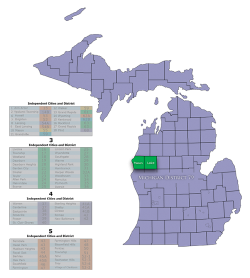Michigan Seventy-ninth Judicial District Court
District Court
Michigan's Seventy-ninth Judicial District Court presides over the counties of Lake and Mason.[1]
Judges
- Peter J. Wadel
- Mark S. Wickens (Chief judge) [1]
Reduced judgeships
This court is one of several that will be affected by legislation decreasing the number of judgeships in the state. Effective February 2012, Governor Rick Snyder signed bills which will eliminate 36 judgeships through attrition. In the 79th District, the court will eventually have only one judge.[2]
To learn more about the legislation, read: Bills to eliminate 36 judgeships head to Gov. Snyder, February 17, 2012.
See also
External links
- Michigan Courts, "Trial Courts Directory"
- MLive, "Judgeships to be eliminated in Newaygo, Oceana, Lake, Mason counties," February 22, 2012
| |||||||
Elections
- See also: Michigan judicial elections
Michigan is one of 43 states that hold elections for judicial positions. To learn more about judicial selection in Michigan, click here.
- Michigan local trial court judicial elections, 2025
- Michigan local trial court judicial elections, 2024
- Michigan local trial court judicial elections, 2023
- Michigan local trial court judicial elections, 2022
- Michigan local trial court judicial elections, 2021
- Michigan local trial court judicial elections, 2020
- Michigan local trial court judicial elections, 2019
- Michigan local trial court judicial elections, 2018
- Michigan local trial court judicial elections, 2017
- Michigan local trial court judicial elections, 2016
- Michigan judicial elections, 2014
- Michigan judicial elections, 2012
- Michigan judicial elections, 2010
Selection method
- See also: Nonpartisan election of judges
Judges of the Michigan District Courts are each elected to six-year terms.[3] The elections for this court are nonpartisan contested elections. To serve on this court, a judge must be a qualified elector of the district, licensed to practice law in the state, under the age of 70, and have five years of experience practicing law.
Election rules
Primary election
If there are more than twice the number of candidates than there are judgeships up for election, the race will appear on the primary election ballot. In the nonpartisan primary, the two candidates who receive the greatest number of votes advance to the general election.
General election
If there are not more than twice the amount of candidates than there are persons to be elected, the race will not appear on the primary election ballot, but only on the general election ballot.[4]
Ties
If two or more candidates in a race receive the same number of votes, the election is to be decided by lot. In a process run by a county clerk, the candidates choose slips of paper from a box that say either "elected" or "not elected".[5]
Footnotes
- ↑ 1.0 1.1 Michigan Courts, "Lake County," accessed July 22, 2014
- ↑ MLive, "Judgeships to be eliminated in Newaygo, Oceana, Lake, Mason counties," February 22, 2012
- ↑ Michigan Courts, "Michigan Trial Courts," accessed April 3, 2017
- ↑ Michigan Legislature, "Michigan Election Law, Section 168.540," accessed July 9, 2014
- ↑ Michigan Legislature, "Michigan Election Law, Section 168.851," accessed August 27, 2014




